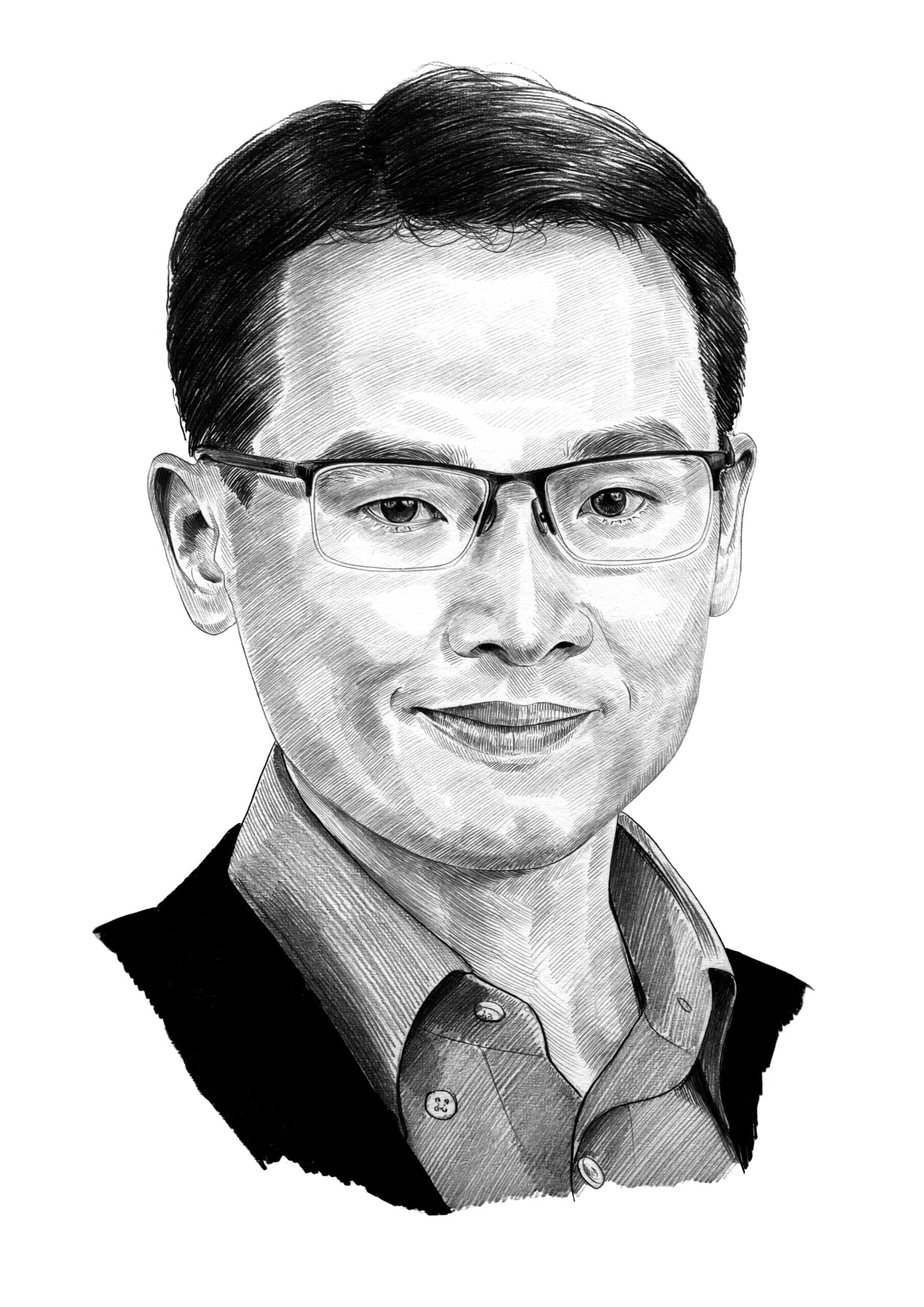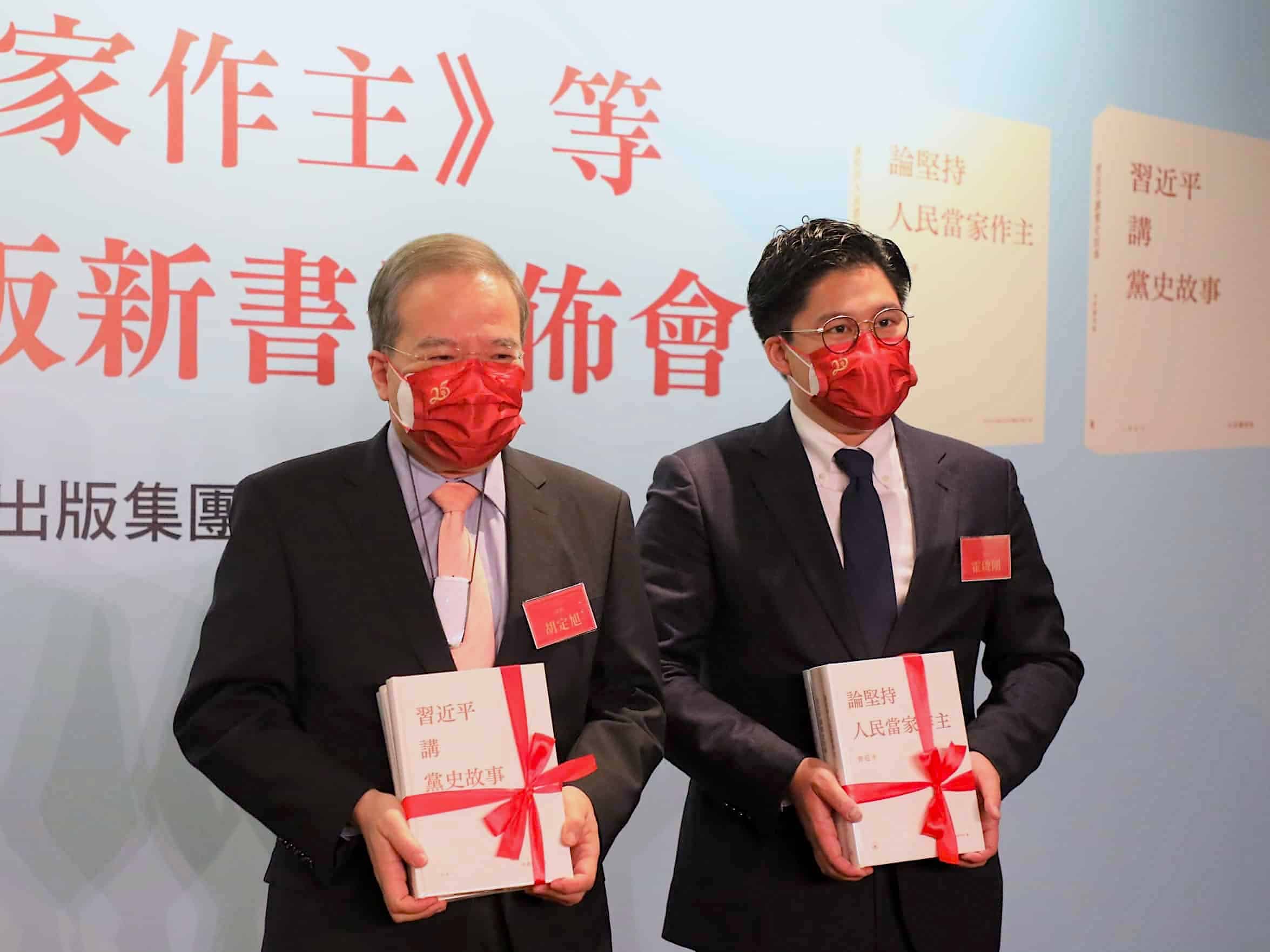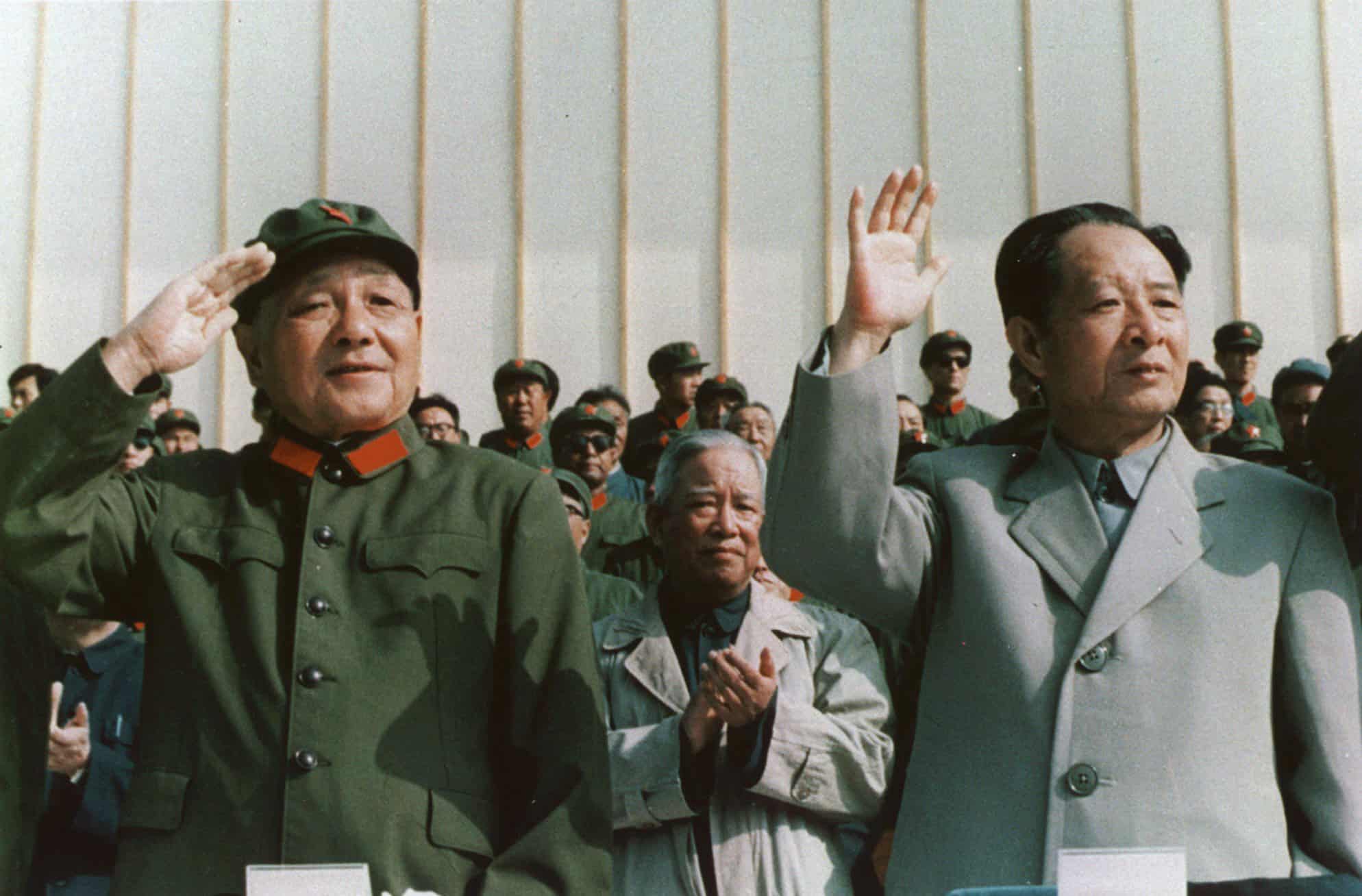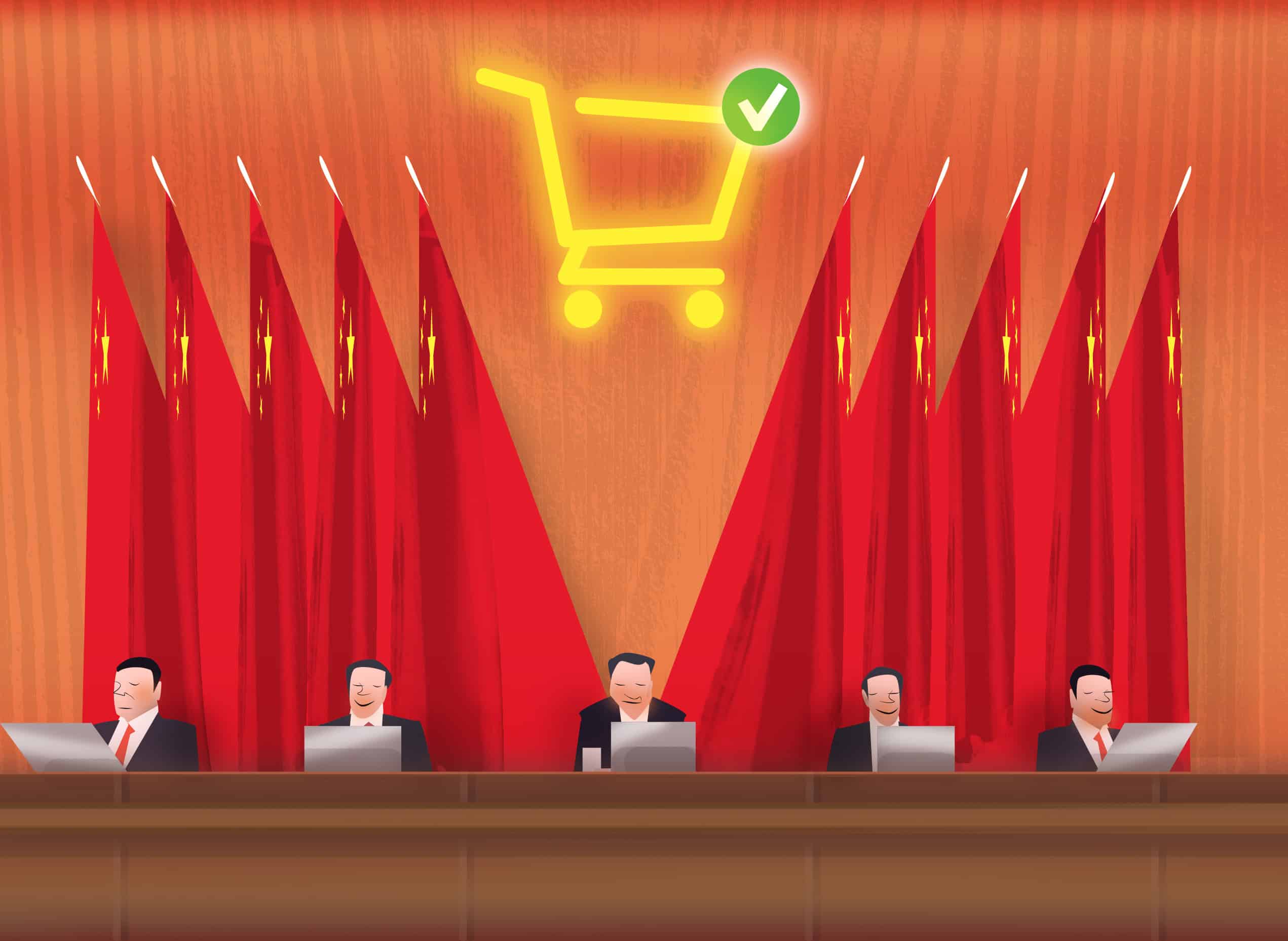Chun Han Wong is a reporter at The Wall Street Journal, where he covers Chinese politics and foreign policy. In 2019, he was effectively expelled from mainland China after he published an article about Xi Jinping’s cousin, and in 2021, he was part of a team of reporters at The Wall Street Journal that was named as Pulitzer Prize finalists for their coverage of China’s autocratic turn under Xi Jinping. He recently published a book, Party of One: The Rise of Xi Jinping and China’s Superpower Future, about Xi’s rule and his impact on the Communist Party.

Illustration by Lauren Crow
Q: For people who have not yet read it, what is the focus of your new book?
A: The book is trying to explain Xi Jinping’s China, and more specifically, the Communist Party and how they’ve changed. The party used to operate more from the shadows: it was trying to become more of a governing party, where it took a step back from the frontlines. It put the state agencies at the forefront of governance, and there was a more professional distance between the state and the party, which is an idea more familiar to Western democracies.
Now, Xi has put the party unequivocally at the forefront of everything. When he talks about ‘the party leads everything’, he means it. He puts it in control, in everyone’s face, there’s no more hiding behind the government system. They no longer try to pretend that there is separation of state and the party.
This book attempts to explain how this happened, why it happened, and what this means for China and the outside world. I talk about the diplomatic, economic, and social impact through the chapters of the book. I also try to ‘crystal ball’ a bit. Given what Xi has done to China over the past 10 years, especially in terms of leadership succession, I think it is incumbent on people trying to analyze China to at least offer some frameworks to try to picture what China might look like after he leaves power.
Why has Xi centralized everything in the party?
| BIO AT A GLANCE | |
|---|---|
| AGE | 37 |
| BIRTHPLACE | Singapore |
In some ways, you could trace this instinct back to his own youth; and also, more recently in his career, the immediate years before he actually took power. Xi grew up during the Cultural Revolution and the chaotic era under Mao. His personal story is essential in explaining why he sees the party as a source of order and stability, because he lived through an era of great disorder and great instability. And he and his family suffered greatly for it.
Then before he took power, there was a period when China was seen as prospering economically, but the party had lost control to some extent. It had allowed social and economic forces to take root and steer society in directions that the party hadn’t anticipated. We’re talking about the Hu Jintao era, where there were problems with social tensions rising. The party was not able to get a grasp on the problems that rapid economic growth was causing. Xi Jinping, in the private conversations he had — for example, with then-Vice President Joe Biden, when he visited China in 2011 — talked about this. He said things like, China needed a more centralized leadership, because without a strong centralized leadership, the centrifugal forces within Chinese society could pull apart the nation and the state. For Xi, there’s only one political force in existence that could provide this centralized, strong leadership, and that would be the Communist Party.
I am curious about what explains Xi’s rise. You write in the book that he is reluctant to lean on the connections that his family affords him, but you also write that his performance in his early positions was not outstanding.

He may have been reluctant to use his connections, but that doesn’t mean he doesn’t benefit from them. The connections between people who you know, who your friends are, that is the product of your upbringing, a product of the circumstances of your birth, and Xi cannot control that. He was born to parents who had this particular status within the party, and that informed his worldview, shaped his connections, shaped the people he had the opportunity to encounter in his career [Xi’s father Xi Zhongxun was himself a senior party leader]. He may not have aggressively tried to exploit this, to the extent that some of his peers in the party did: you might think of Bo Xilai [former Chongqing party chief and princeling who is now in jail], for example. Bo was far more open about using his family background in trying to get ahead in the party.
Xi was more subtle, but he still benefited. People knew who he was, people knew who his father was. His parents helped him connect with mentors and secure certain jobs early on. It’s hard to know how far Xi pushed this in trying to advance his career, but he did put in a lot of personal work in trying to play the best of the hand he was dealt. He was very good at networking, he did his best at glad handing people, wining and dining with important officials, visiting party elders and officials during the lunar new year holidays, the kind of stuff that you need to do to maximize the goodwill that you’ve inherited and the connections that you gain from your family circumstance. Is it nepotism? I don’t think it’s quite that.
| MISCELLANEA | |
|---|---|
| FAVORITE MUSIC | Cowboy Bebop and Samurai Champloo soundtracks. |
| FAVORITE FILM | Yojimbo. Among Chinese films, one standout for me is Blind Shaft. |
| MOST ADMIRED | My mother, for making everything possible. |
In terms of his political record, it’s not particularly outstanding. But Xi kept his head low, he played his cards to the best of his ability. He also cultivated the right people: for example he got to know people like Jia Qinglin, who was Party Secretary in Fujian, and through such connections, he clearly got into the favor of people like [former Chinese leader] Jiang Zemin, who became an important influence over his career and shepherded him into the upper echelons of the party.
Throughout the book, you write about the princeling community [‘Princelings’ is the term commonly used for those, like Xi, who are the descendants of early CCP leaders], and you describe how at first, they were broadly happy with Xi’s rise. How does that relationship between Xi and princelings evolve over his reign?
It does quite significantly, at least for a particular group of princelings that I’ve met and or I’ve spoken with through their intermediaries. Basically, there is a sizable contingent of princelings, including people who have known Xi for a very long time, who grew up together or whose parents knew each other. When Xi Jinping took power in 2012, the general mood among them was quite optimistic because they had come to believe that China needed change. China was at a crossroads: economically doing well, but politically, the way things were was not sustainable and the party had some serious internal issues that needed dealing with. First and foremost, corruption, which a lot of princelings understood, was arguably the biggest existential threat the party faced. It undermined the very roots of party legitimacy, and, if not resolved, could bring down the party.

Xi Jinping was seen as this guy, who, first of all, could do the job. But, more importantly, he was one of them. Some of the issues that princelings had with people like [former Premier] Li Keqiang were not that they were incompetent, but that they were not quite from the same stock as someone like Xi. Princelings tend to see themselves as more inherently loyal to the revolution and to the party because they are literally the descendants of the revolutionary elders who built the nation, who fought the revolution and founded the People’s Republic. They inherited the revolution and therefore they are the most committed to the perpetuation of communism. The comparison they made was with the fall of the Soviet Union, which many princelings blame on the rise of officials and apparatchiks who had no natural loyalty to the party — someone like Gorbachev, whom they saw as a traitor to the party.
| BOOK RECS | |
|---|---|
| For fiction, my favorites are Catch-22 and Cat’s Cradle. My non-fiction pick would be Command and Control by Eric Schlosser, a masterful mix of narrative drama and historical sweep. |
|
This is something that Xi himself articulated in his famous secret speech during his first inspection tour after taking power. He visited Guangdong, and talked privately about there having been no one ‘man enough’ to save the [Soviet] regime. That sort of sentiment was shared quite widely among princelings.
But some of the princelings realized, after Xi took power, that he was not leading the party in the way they had hoped he would.
One thing that Xi did that upset some princelings was that he cut them off progressively, as he consolidated his position, and he stopped talking to some people he used to talk to. After he became General Secretary, he started to build a more tightly knit inner circle around himself, so people who used to be able to talk to him, people who saw themselves as friends, could no longer express their views; or if they could, they had to do so through intermediaries — they couldn’t meet or speak directly to Xi. That disappointed some people, especially those who came to realize that their vision of what China should become, or what the party should become, deviated from where Xi Jinping was taking the party.
Xi has basically made sure that, in order to have any influence over policy making, you have to have an actual position. He’s the most prolific codifier of party regulations in party history.
There were some princelings who thought China needed, not necessarily to democratize, but at least to liberalize some parts of his political system, to make it more subject to scrutiny, to foster a bit more rule of law so that the party and its officials are not as able to abuse their powers as in the past. Xi, as we now know, took the party in a far more autocratic direction, and has centralized power to the extent that even the princelings didn’t expect. A lot of them became very disappointed, especially when he started attacking some people that were within the broad princeling elite community. People like Ren Zhiqiang [a retired real estate tycoon and princeling], for example, when he spoke out against Xi’s demands for media loyalty in 2016. Those comments earned him a social media ban and suspension from the party, while a Beijing news portal called him anti-party — a very serious accusation, especially for people who grew up during the Mao era. Ren would later be expelled from the party and jailed in 2020 after attacking Xi’s handling of Covid. So people saw that Xi was willing to take down fellow princelings who dared to criticize his policies. That became a big turning point for many princelings, where they start to think he’s gone too far.

This sentiment, to my knowledge, has only intensified as the years have gone by, and as Xi continued to consolidate more power, and basically isolated himself from a lot of people he used to speak with, or who would call themselves his friends. Even Wang Qishan [previously a close Xi ally who was previously Vice President of China and head of the Central Commission for Discipline Inspection], became a target of some of the tactics that Xi uses to undermine people around him, so that they could not pose even a latent threat to his power.
Given that lack of access, do the princelings have any power or influence today?
The broad princeling community from around Xi’s generation is more or less cut off from policymaking circles. There are princelings who are in positions of influence, but that influence is much diminished compared to what it was. A lot of these people have retired, some have died, so this is a community that’s naturally diminishing due to age, due to incapacitation, and other reasons, including being purged.
Xi has basically made sure that, in order to have any influence over policy making, you have to have an actual position. He’s the most prolific codifier of party regulations in party history. It’s meant to basically make clear how he wants the power structure to function, make reporting lines more clear, make positions of influence — and what authority they possess — more clear. And if you’re not within that structure, your ability to influence events is much diminished.
You mentioned all the people around Wang Qishan who have been taken down in recent years. What do you make of that?

It’s hard to know for sure why Xi Jinping made these moves against Wang Qishan, or what we perceive to be these moves. Ultimately, a lot of these things are hard to clearly discern, because we don’t have perfect information — even people within the party don’t have perfect information. And that’s one thing that people need to understand. If you’ve read this book by Joseph Torigian about power struggles in the Soviet Union, and Mao’s China, we need to understand that within the party, such a secretive organization, nobody has perfect information, even the leader. He may have the most comprehensive set of information, but it’s not perfect.
I think we can, to a strong degree, infer that Wang Qishan has been targeted because we know that people around him were purged or detained for a period of time. This pattern of detentions and investigations seemed very targeted: as we know from past such investigations, they tend to go after someone without actually taking them down, because that’s a safer way to go about these things. You don’t want to force your potential enemies to think they have no other choice but to act against the leader. If they think that their backs are not against the wall, that they can survive, that they have a reasonable chance of security, then their incentives for actually taking action against the leader are diminished, or at least reduced to a level which the leader can accept.
So going after Wang Qishan this way is the politically smart way to do it. You don’t really want to directly target someone who is widely seen as the guy who fronted your anti corruption campaign for five years. If someone like that is taken down, it could only undermine public perceptions of the party, and the legitimacy of the anti-corruption campaign.
The thing about Xi is he tries to achieve these political outcomes by using the [exact] amount of political capital that he feels that he needs to expend. He doesn’t need to take down the person, he just needs to make sure he’s no longer a threat. So I think that’s what we see happening to Wang Qishan.

One of your chapters is about Xi’s attempt to completely control history. Why is that an important priority for him?
Xi understands that a key source of Mao Zedong’s power was his ability to tell stories, and he is trying to emulate that to the best of his ability. One of the early books of party literature that is meant to elevate Xi’s standing and promote him is called Xi Jinping Jiang Gushi (Xi Jinping Tell Stories). That is a very direct attempt to position Xi as someone who is similar to Mao, who is able to inspire people to make sense of big events and set a narrative, set a direction for the party and for the Chinese nation.
He talked about this right from the very beginning. In one of his first meetings he had with the new Central Committee that was appointed in late 2012, he quoted a Chinese intellectual saying, ‘to destroy a nation, you must first destroy its history.’ He meant it as a warning, but the opposite is also true. If you want to build a nation, you need to flesh out its history, you need to give it a compelling story that will inspire and rally the people around this idea.
In trying to emulate what he believes to be Mao Zedong’s ultimate source of power, Xi understands that he must not allow other people to challenge this vision that he’s selling.
In trying to emulate what he believes to be Mao Zedong’s ultimate source of power, Xi understands that he must not allow other people to challenge this vision that he’s selling. So there’s two aspects: one, you have to provide your story and propagate it to the maximum extent possible; and two, you have to guard that story against people who might undermine it and attack it. So you have both a massive propaganda effort, as we saw, for example, in 2021, with the party history study campaign. At the same time, that needs to be defended. So even before that, we had a series of legislative moves designed to protect what the party defines as official canon. In 2018, we had the law on the protection of heroes and martyrs, which we have since seen being used against people who dared to challenge the official versions of historical events. And we’ve had very substantive censorship efforts, online and also in the print world and mass media.
How do historians working in China deal with the tight policing? Are there ways to deal with this pressure?
The pressure is very great on historians, especially within China, to do the kind of research and historical output that the party would like to see. One of the leading examples is the creation of the Chinese Academy of History in 2019, as arguably the highest authority on popular history. There are people who will try to resist, or at least not cooperate with this state-directed effort to shape narratives. The resistance, or non-compliance, can range from declining opportunities to collaborate in party or state-directed efforts to produce new historical content. Or it could be leaving altogether, like Sun Peidong and Pei Yiran did [two Chinese historians in the book who decide to leave China].
There are others who do the best they can to do the kind of scholarship they actually are interested in and they believe in. And in some cases, this means drilling down to very obscure and very niche things that still have historical value, but which might not have the kind of broader political implications that will draw attention from the Party. It could be things like translation, or just verifying the provenance of certain documents, going through archives, going through papers just to ascertain where a particular document comes from. Basically, things that are quite esoteric, and quite niche that would therefore escape the scrutiny of the party. There’s also people who continue to publish sensitive stuff, but secretly. Ian Johnson has a book coming out soon called Sparks, that talks about this phenomenon — underground historians, researchers, amateur historians who do their own work and try to keep historical memory alive. This is not a new phenomenon, but it’s taken on a more serious significance under the new political context of suppressing alternate historical narratives.
And there are also people who also basically write for the desk drawer; you can’t publish it now, but you live in the hope that one day, political circumstances will change enough that it becomes not so sensitive, and you can publish.
Outside of China, there’s more scope for historians who are not directly subject to state censorship. But they do face challenges as well, because a lot of them find that they cannot access Chinese archives, or if they do, a lot of the things they used to be able to see they cannot see anymore. The people they used to talk to, they can’t talk to anymore, or these people have become less willing to talk. So it is more challenging.
What happens after Xi?
This is the most difficult question to answer, because it’s mostly educated guessing. You start from the basis of what we do know about party succession principles, and how the party in the past has managed transfers of power, and certain things that Xi Jinping has said that give some hints as to what his views are on succession. The problem is, we simply don’t know what Xi truly thinks about how he wants to handle succession. It is a question that only he really knows the answer to. And even then, he may not fully know the answer, because he may have a plan of how he wants to hand over power, but this plan can change due to circumstances or his realization that assumptions he made about certain potential successors were wrong. This is something he understands, because he’s seen it happen: He saw Mao change his designated successor in fairly dramatic circumstances, and Deng Xiaoping, too. So two great leaders before him didn’t get succession right the first time, not even a second time.
A lot of it depends on how the succession process plays out. Xi’s ideal scenario is that he manages to find a successor whom he trusts, who is absolutely loyal to his agenda, and wants to uphold his legacy. There’s a chance that Xi’s structure of governance, Xi’s vision for China, will be able to survive at least for the term of his successor.

But as I point out in the book, it’s often the case that a strong leader is succeeded by a weaker one. For a leader to be willing to hand over power, it’s very unlikely he’ll be handing over power to someone who is strong enough to be seen as a peer in terms of his authority. If that were the case, there is a good chance that the would-be successor would have tried to seize power or undermine the incumbent already in some way.
And if the successor is weak, it leads to the question, can he hold together a party that essentially has been shaped over the past decade or more, around autocratic principles, where you have a guy who essentially put himself at the center of political life in China. A lot of things would have to be done with his implied or explicit consent.

If the successor is not able to fulfill that role in this particular system that Xi has crafted around himself, it does pose questions, such as can this system that Xi created around himself be perpetuated? Can it survive a weak leader? That is a very difficult question to answer. Any attempt to do so would essentially be mostly speculation, but I think it’s incumbent on us to think about these issues. We may not know the answer, but I think if we at least attempt to understand what’s at stake, attempt to understand the principles behind how these transfers of power might play out, then we stand a better chance of dealing with these situations as they emerge.
Do you think people are thinking about that in the party now?
Definitely. For any leader, a key concern from the day you take power is succession. Because whatever you do today, all your great achievements will come to naught if you fail in succession. So any leader who was actually able to establish himself in power and govern for a reasonable amount of time, would have devoted thought to this issue. And people around him would have done the same because there are people who want to succeed him, or put themselves in position to at least be in the running to become the next leader. And there are people who want to influence the process, whether as kingmaker or simply as an interested party who has a vested interest in certain people taking power versus another person taking power.
…in a Leninist, autocratic system that Xi has now come to control, Xi has far more power over succession than most other political leaders.
This is not unique to Chinese politics, nor is it unique to Leninist systems like China’s. In many political systems, the leader must consider the issue of succession. Yes, in many democracies, the leader cannot necessarily control succession in terms of who becomes the next president or who becomes the next prime minister. But he or she can try to influence it. It is just that in a Leninist, autocratic system that Xi has now come to control, Xi has far more power over succession than most other political leaders.

Katrina Northrop is a journalist based in Washington D.C. Her work has been published in The New York Times, The Atlantic, The Providence Journal, and SupChina. @NorthropKatrina




